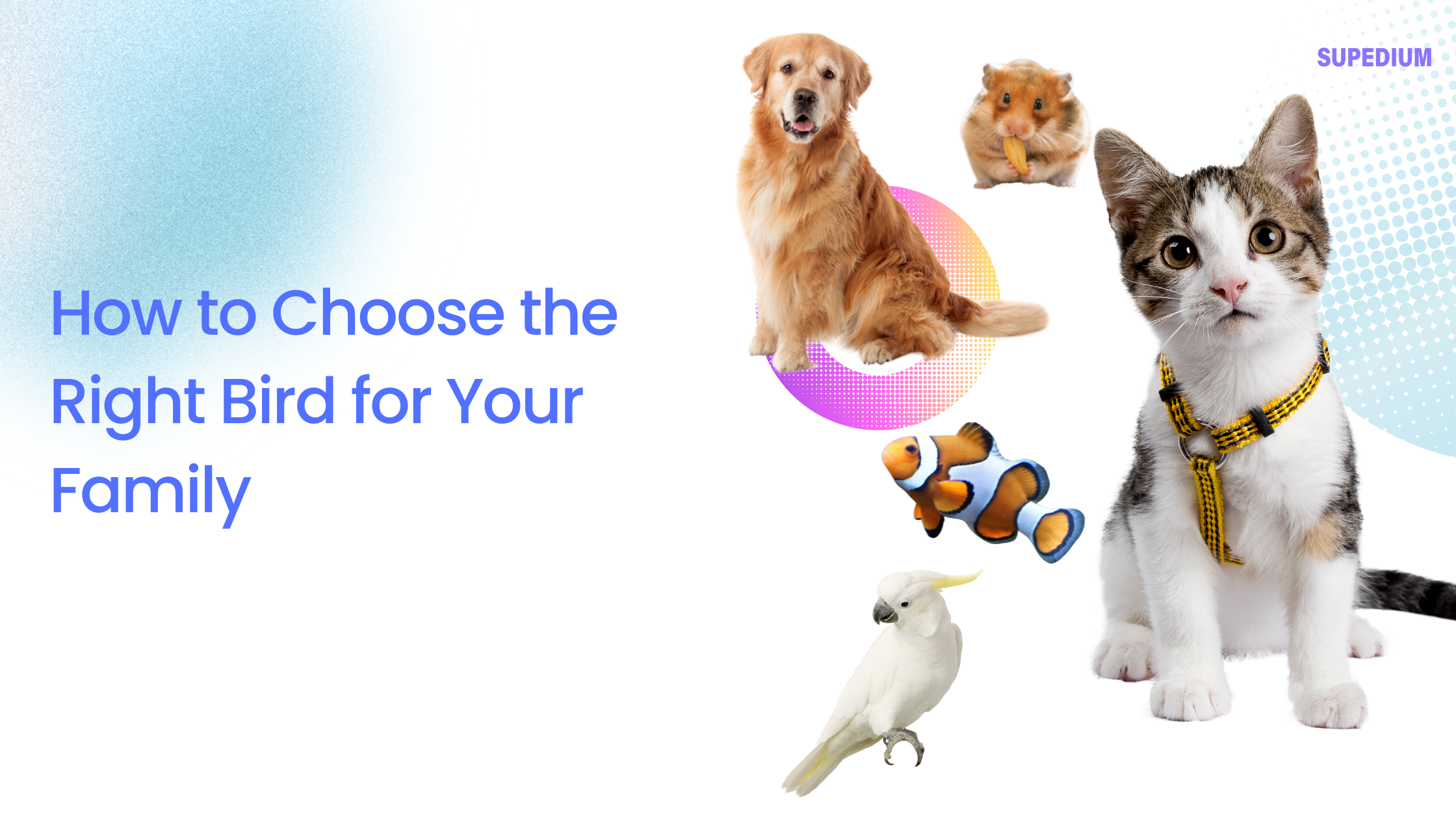Table of Contents
![]()
Choosing the right bird for your family is a significant decision that involves more than just picking a pet that looks appealing. Birds can make wonderful companions, but their needs and characteristics vary widely among species. Ensuring a good match between a bird’s needs and your family’s lifestyle will contribute to a harmonious and fulfilling relationship. Here’s a detailed guide to help you make an informed decision.
Understanding Your Family’s Needs and Lifestyle
Assessing Family Dynamics
Before choosing a bird, evaluate your family’s dynamics. Consider the age of family members, as some birds may not be suitable for homes with young children due to their delicate nature or potential for loud noise. Additionally, be aware of any allergies or sensitivities to bird dander. Understanding your family’s activity levels and noise tolerance is also crucial, as birds vary in how much noise they make and how active they are.
Time and Commitment
Birds require daily care and attention. Small birds like parakeets may need less time than large parrots, but all birds benefit from regular interaction and mental stimulation. Consider whether you have the time to dedicate to a bird’s social and physical needs. Also, remember that many birds, especially larger species, have long lifespans and require a long-term commitment.
Space and Environment
The size of your living space will influence your choice. Birds need appropriate cage sizes and, for larger species, ample room to fly and explore. Ensure that your home can accommodate the specific needs of the bird you are considering, including both indoor and outdoor space if applicable.
Budget Considerations
Evaluate the financial aspects of bird ownership. Initial costs include the purchase price, cage, and accessories. Ongoing expenses encompass food, veterinary care, and grooming. Different species have different needs, which can affect the overall cost of ownership.
Types of Birds and Their Characteristics
Small Companion Birds
- Parakeets (Budgerigars): These small, colorful birds are ideal for families with children. They are social and can learn to mimic sounds. They require a moderate amount of interaction and a cage that allows for flight and exercise. Their small size means they need less space compared to larger birds.
- Canaries: Known for their singing ability, canaries are best suited for families who enjoy melodic sounds rather than interactive pets. They are relatively low-maintenance, requiring a cage with a perch and regular feeding. Canaries are not as interactive as other species but can be a beautiful addition to your home.
- Finches: Finches are small, active birds that thrive in pairs or groups. They are less interactive with humans but are entertaining to watch. A spacious cage with ample perches and toys is necessary to keep them healthy and stimulated.
Medium-Sized Birds
- Cockatiels: These birds are affectionate and can be trained to perform tricks. They are known for their playful nature and can adapt well to family life. They require regular social interaction and a moderate amount of space for exercise.
- Lovebirds: Lovebirds are known for their strong pair bonds and can be very social with their human families if handled regularly. They need a suitable cage size and plenty of interaction. They can become quite attached to their owners and are known for their playful behavior.
- Conures: Conures are lively and colorful birds with strong personalities. They require regular interaction and can be noisy, so they are best suited for families who can accommodate their vibrant nature. A large cage and frequent social interaction are essential.
Large Birds
- African Grey Parrots: Renowned for their intelligence and ability to mimic human speech, African Grey Parrots require a high level of mental stimulation and social interaction. They have a long lifespan and need a large, enriched environment to thrive.
- Cockatoos: These birds are known for their emotional needs and strong social bonds. They require extensive interaction and can be demanding. Their large size means they need a substantial cage and a lot of attention.
- Macaws: Macaws are among the largest pet birds and require significant space and attention. They are highly social and can be very loud. Their care involves a substantial commitment, both in terms of time and financial resources.
Evaluating Bird Care and Maintenance
Cage Requirements
The cage is a critical component of a bird’s environment. It should be large enough to allow for movement and include accessories like perches, toys, and food dishes. The size and design of the cage will vary depending on the bird species, with larger birds requiring more spacious and complex setups.
Diet and Nutrition
Each bird species has specific dietary needs. While some birds require a varied diet including fruits, vegetables, and seeds, others may need specialized pellets or supplements. Research the dietary requirements of the bird you are interested in to ensure you can meet its nutritional needs.
Health and Veterinary Care
Regular veterinary care is essential for maintaining a bird’s health. Finding an avian vet and understanding common health issues for the species you choose is crucial. Regular check-ups and prompt attention to health concerns will help ensure a long and healthy life for your bird.
Preparing Your Home for a New Bird
Bird-Proofing Your Environment
Before bringing a bird home, bird-proof your environment to ensure safety. This includes removing hazards such as toxic plants, small objects that could be swallowed, and unsafe areas for flight. Create a safe space for the bird to explore and exercise.
Introducing the Bird to Your Home
Introduce the bird gradually to its new environment. Set up the cage in a quiet area where the bird can acclimate. Gradually allow the bird to explore and interact with family members to ensure a smooth transition.
Training and Socialization
Basic Training Techniques
Training can enhance the bond between you and your bird. Start with basic commands and handling techniques to build trust and encourage positive behavior. Consistent and gentle training methods will help your bird adapt to its new home and learn desirable behaviors.
Socialization with Family Members
Ensure that all family members understand how to interact with the bird to foster positive relationships. Address any behavioral issues promptly and establish routines that support the bird’s social and emotional needs.
Resources and Support
Finding Reputable Breeders or Rescues
Research reputable breeders or consider adopting from shelters. Reputable breeders can provide information about the bird’s health and history, while rescues often have birds in need of loving homes. Ensure that any source you choose practices ethical breeding or adoption standards.
Joining Bird Communities
Connecting with bird communities, such as online forums or local bird clubs, can provide valuable support and information. These resources can offer advice, share experiences, and help you stay informed about best practices for bird care.
Conclusion
Choosing the right bird for your family involves careful consideration of your lifestyle, the bird’s needs, and long-term commitment. By understanding the characteristics of different bird species and preparing your home for a new feathered friend, you can ensure a rewarding and harmonious relationship. A well-chosen bird can bring joy and companionship, enriching your family life for years to come.
Share This





Be the first to comment